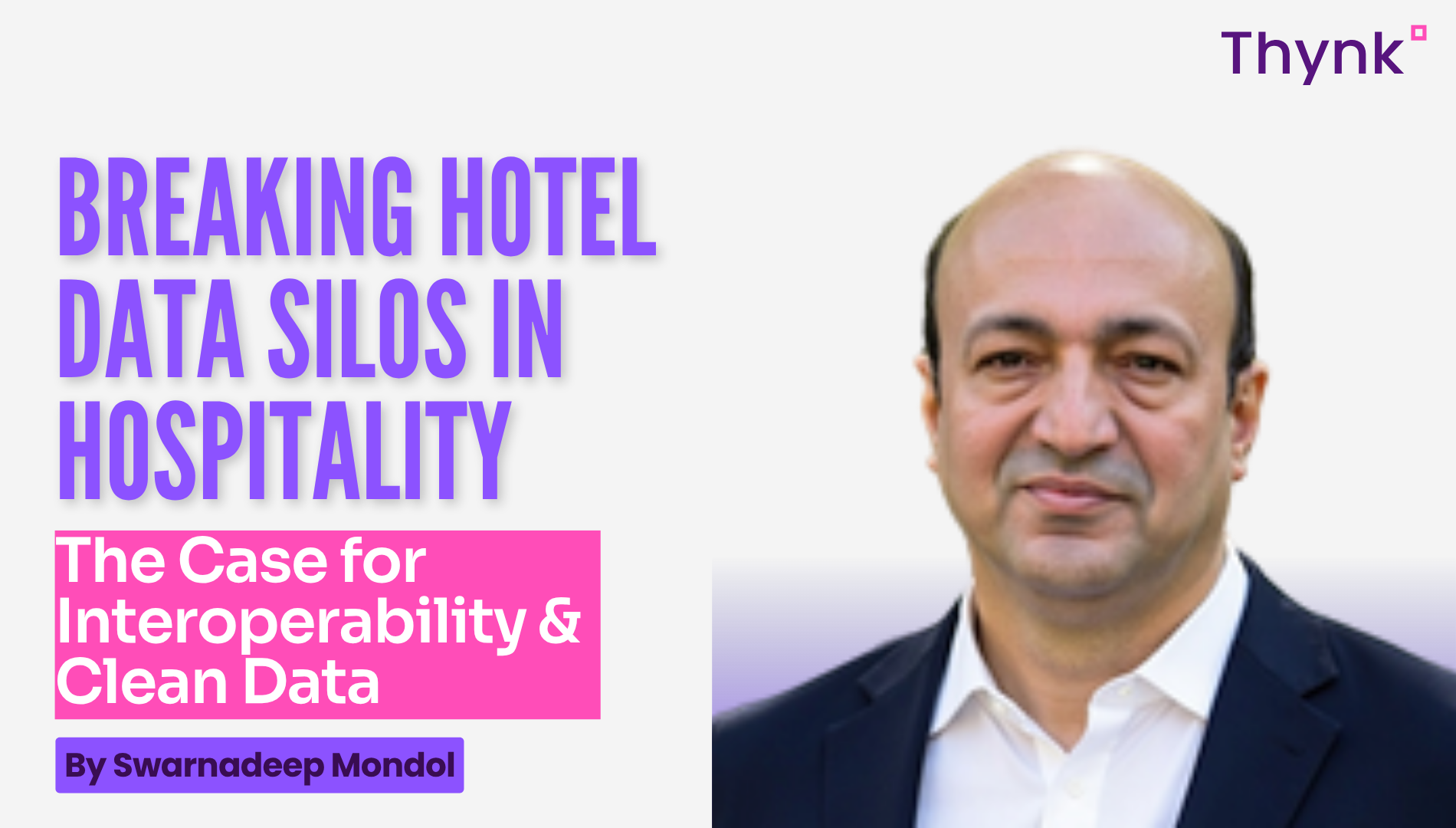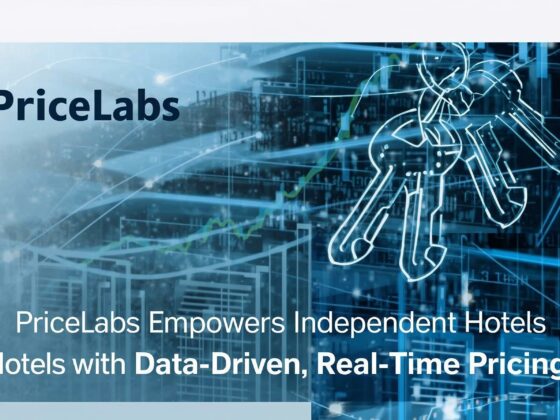
Editorial Abstract
The hospitality industry is undergoing an invisible crisis. While hotels have embraced technology across nearly every touchpoint—from reservation engines and channel managers, to CRMs and revenue management systems—most are trapped in a siloed ecosystem where these solutions rarely share data effectively without some manual intervention. Data is duplicated, delayed and distorted, creating friction that diminishes operational efficiency, costing hotels revenue and eroding the guest experience.
This paper explores how data silos have become the single greatest barrier to digital transformation in hospitality. Drawing on research from IBM, McKinsey, Cornell, Skift, MuleSoft and others, it illustrates the economic and strategic cost of disconnected data, the global movement toward interoperability and what hotel leaders can do to modernize their digital foundations for the age of automation and AI.
Executive Summary
In 2025, the conversation about hospitality technology has shifted from innovation to integration. Every system – including the PMS, RMS, CRS, CRM, and POS – were designed to solve a distinct problem; unfortunately, they rarely share a single data model so hotels’ operations are based on a “digital patchwork,” which is efficient within departments but creates blind spots when looking at the property’s business from a holistic point of view.
Data fragmentation is a costly mistake that impacts the majority of properties today. According to Skift Research’s 2025 Hotel Technology Priorities (R6), 93% of hotel leaders list “system integration” as their top strategic technology challenge. MuleSoft’s Connectivity Benchmark 2025 (R7) reports that 95% of organizations face data integration issues that directly hinder their ability to implement AI and automation.
Meanwhile, IBM’s Cost of a Data Breach Report 2025 (R1) calculates the average global breach cost at $4.44 million, with hospitality ranked among the most vulnerable industries due to its dispersed, vendor-dependent architectures.
This white paper traces how hospitality arrived at this point and why the next competitive edge won’t come from adopting new systems, but from connecting pre-existing ones.
A System Built for Yesterday
Walk into any major hotel group, and you’ll find a familiar technical architecture: a PMS designed in the 1990s, a CRS layered on top, a separate RMS optimizing rates, a CRM managing guest communications and an ERP overseeing finance. Each was introduced with good intentions (efficiency, control and/or better reporting) but the unintended consequence was fragmentation.
Cornell’s Future of Revenue Management study (R3) documented that even as revenue management systems became more sophisticated, they often operated on stale data, disconnected from real-time booking patterns or POS consumption. The lack of real-time data meant hotels were pricing their rooms based on yesterday’s facts.
Skift’s early Hotel Tech Stack report (R6) warned of this nearly a decade ago: “Technology adoption in hospitality has been vertical, not horizontal.” New software layers were added without dismantling the old, resulting in an inefficient tech stack where information flows inconsistently across departmental silos.
The result? Managers spend more time reconciling spreadsheets than serving guests, data analysts run redundant reports, and senior leaders make commercial decisions with partial visibility, trusting instinct over insight.
The Cost of Fragmentation
The cost of data silos may not appear on hotels’ balance sheets but their impact is measurable across four key dimensions: revenue, productivity, compliance and reputation.
Revenue Erosion
When RMS aren’t receiving live pickup data or comp-set signals from the CRS or OTA feeds, revenue opportunities vanish. Cornell’s research (R3) ties RevPAR growth directly to the accuracy and timeliness of data. McKinsey (R2, R9) further notes that personalization, enabled by unified customer data, can increase total revenue by 5–15% and ROI on marketing by 10–30%.
In real terms, hotels operating on fragmented systems are leaving money on the table every day, through delayed room rate updates based on inaccurate data, missed opportunities to cross-sell/upsell guests and unrecognized repeat guests.
Operational Inefficiencies
Every integration between two operational systems is a maintenance contract, a potential point of failure, and a big line in the budgets of most companies; in fact, MuleSoft (R7) estimates that companies spend up to 40% of their IT budgets maintaining integrations that don’t scale. In hospitality, where the same integration is often repeated across hundreds of properties, the cost multiplies exponentially.
Anaconda’s State of Data Science 2024 (R5) revealed that 80% of data professionals spend a quarter to half of their time cleaning and reconciling data – an inefficiency that trickles down to the rest of the organization, leaving sales teams waiting for updated reports, finance teams waiting for reconciliations, and GMs waiting for strategic and operational clarity.
Compliance and Risk
IBM’s (R1, R10) data shows hospitality’s vulnerability to data fragmentation, as it highlights that hotels often work with multiple tech vendors, who offer inconsistent encryption and incomplete audit trails. When guest data is duplicated across the PMS, CRM and POS, every copy increases the property’s risk for exposure; in an age where data breaches cost companies millions, fragmented data isn’t just inefficient… It’s dangerous.
Brand and Reputation
Cornell and ReviewPro’s (R4) joint research confirmed what operators already knew: reputation drives revenue. A one-point improvement in online review scores can increase ADR by up to 11%; however, when loyalty program recognition or guest preferences are not adhered to due to broken integrations, the guest experience falters, ratings decrease and revenue follows.
From Data to Decisions
Integration isn’t only about connecting databases; it’s about connecting decision-makers with the necessary data to make better, data-informed decisions.
Imagine how much it would change your operations if your hotel’s RMS updated your pricing dynamically as new bookings flow in, if your marketing was automated and able to provide specifically tailored offers based on guests’ in-stay behavior, and if your F&B analytics would inform event sales in real-time.
For other industries, this isn’t a hypothetical situation… In the retail and aviation industries, this level of interoperability is already standard. The airline industry’s NDC and ONE Order initiatives redefined how carriers manage inventory and customer journeys; by contrast, the hospitality industry remains largely transactional.
Skift’s 2025 research (R6) argues that hotels are now facing their own “NDC moment.” Data needs to flow in real time between systems, not through CSV exports or nightly batches, but through event-driven architectures.
The Next Era of Interoperability
The push toward interoperability represents a profound mindset shift: from siloed software to shared data infrastructure.
Event-First Architecture
In a modern architecture, key operational events – including (but not limited to) booking.created, rate.updated or folio.closed – are published instantly across systems. Instead of waiting for nightly updates, each department is able to work from the same source of truth within minutes.
HTNG’s Express PMS Workgroup (R16) has already laid the groundwork for standardizing these event structures across vendors, promising faster integration cycles and lower costs.
Open APIs and Canonical Semantics
A growing number of hotel technology vendors are aligning around shared semantics for guests, bookings and inventory. This “universal language” allows systems to interact predictably without expensive custom mapping.
The benefits are significant: consistent reporting, reduced duplication and the facilitation of compliance efforts. As the MuleSoft report (R7) emphasizes, organizations with strong API strategies experience 64% faster innovation cycles.
Privacy by Design
The IBM/Ponemon (R1) report shows that companies integrating encryption and privacy controls early in their architectures reduce breach costs by an average of $1.5 million. Tokenization and data minimization (rather than replication) are becoming best practices in modern hospitality systems.
Building the Business Case for Connectivity
Interoperability isn’t just an IT priority; it’s a balance sheet issue.
Let’s quantify the opportunity: A 30-property portfolio, averaging 100 rooms, 70% occupancy, and a $120 ADR, generates about $92 million in room revenue. Conservative estimates suggest:
- +0.8% increase in ADR from faster RMS signals (R3)
- +8% conversion improvement from unified personalization (R2, R9)
- $250,000 annual savings in integration costs (R7)
Together, these gains yield roughly $1.8 million in incremental value per year, even before considering improvements in compliance, staff productivity or guest satisfaction.
Governance: Turning Data into a Managed Asset
Interoperability without governance simply multiplies chaos.
Progressive hotel groups are adopting frameworks where Data Product Owners manage specific domains (i.e., Guest, Reservation, Finance, etc.), just as a department head manages operations.
Governance best practices include:
- Establishing business glossaries to harmonize definitions.
- Implementing data contracts to formalize SLAs between systems.
- Tracking lineage to ensure auditability and compliance.
These principles echo the shift seen in financial services, where data stewardship has become synonymous with brand trust.
Roadmap: The 12-Month Path to Interoperability
A transformation of this scale requires a phased approach.
- Baseline (0–3 months): Map all data sources, integrations and data owners. Measure latency and duplication rates.
- Stream (3–6 months): Enable real-time feeds from PMS and CRS. Start publishing operational events.
- Govern (6–9 months): Introduce a schema registry, data quality rules and version control for APIs.
- Scale (9–12 months): Extend interoperability to finance, POS and event systems. Introduce data cost accountability.
Each phase produces measurable outcomes: reduced manual work, faster reporting, improved guest experience and enhanced compliance.
Future Outlook: AI and the Power of Connected Data
Artificial intelligence has finally arrived in hospitality, but its effectiveness depends entirely on data quality. McKinsey (R2) underscores this point: AI adds the most value when trained on clean, complete and timely information.
The next generation of hotel technology (including AI-based RMS, autonomous RFP responders, predictive maintenance engines, etc.) will thrive only in environments where systems share data effectively, in both directions.
As Skift Research (R6) predicts, 2026 will mark a tipping point: hotels that have modernized their data infrastructure will begin operating with “living” dashboards, offering analytics that update in real-time.
In this landscape, interoperability becomes the foundation of agility. The brands that master it will move from reactive to predictive decision-making, translating data integrity into financial performance.
References
R1. IBM/Ponemon, Cost of a Data Breach 2025, global average $4.44M (↓9% YoY).
R2. McKinsey, What is Personalization? (2023).
R3. Cornell Hospitality, Future of Revenue Management (2017).
R4. Cornell/ReviewPro/Ecornell, Influence of Reputation Analytics on Hotel Revenue (2023).
R5. Anaconda, State of Data Science (2023–2024).
R6. Skift Research, Hotel Technology Priorities 2025.
R7. MuleSoft, Connectivity Benchmark 2025.
R8. Axios, IBM 2024 Breach Report Recap.
R9. McKinsey, The Value of Getting Personalization Right—or Wrong (2021).
R10. Baker Donelson, Summary of IBM 2025 Breach Report.
R11–R16. SiteMinder, The Points Guy, AAA, Sage, Elsevier, CoStar, and AHLA/HTNG sources on overbooking, walk costs, and PMS standards.






